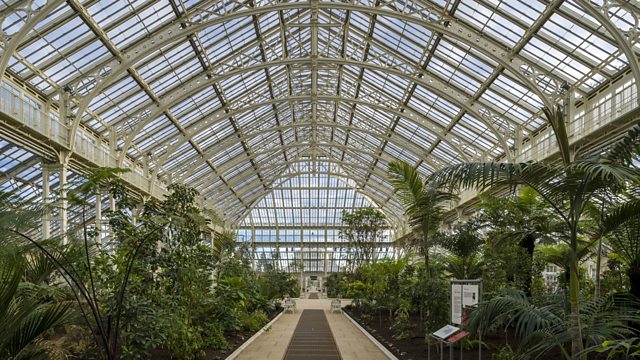The ‘Greatest Glasshouse’ in the World
Re-opening of Kew glasshouse provides a home for thousands of endangered plants. Also, periwinkle pathway to cancer drugs uncovered and the dead zone in the Arabian Sea.
The Temperate House, the extensive Victorian glasshouse nestled within London’s Kew Gardens, will once again be open to the public after 5 years of refurbishments. The building is home to 10,000 plants, across 1,500 species, and many of them are classified as rare and endangered. Roland Pease takes a tour of the newly refurbished building with Director of Horticulture, Richard Barley, before joining Kathy Willis, Director of Science for Kew Gardens in London, for a chat about the science and importance of Ensete ventricosum, aka the false banana plant.
Pretty Periwinkle and the Making of a Cancer Drug
Scientists at the John Innes Centre in the UK, have identified the final steps in the process that allows the tiny pink Madagascan periwinkle to make an anti-cancer drug. Professor Sarah O’Connor explains how researchers from across the world have been uncovering this complex pathway and are now trying to synthesize the medicine in yeast.
Dead Zone in the Arabian Sea
Piracy and geopolitical tensions have made it difficult to monitor the Arabian Sea, leading to data becoming outdated and incorrect. While searching the area and collecting data, using underwater robots, or ‘Seagliders’, Dr Bastien Queste and his team have discovered that a large area now lacks oxygen, impacting on ecosystems and fishing in the region.
Photo: The Temperate House, Credit Gareth Gardner
Presenter: Roland Pease
Producer: Ania Lichtarowicz
Last on
More episodes
Clip
-
![]()
Why are false banana plants good for Ethiopia?
Duration: 01:58
Broadcasts
- Thu 3 May 2018 19:32GMT´óÏó´«Ã½ World Service except News Internet
- Fri 4 May 2018 04:32GMT´óÏó´«Ã½ World Service except Australasia, East and Southern Africa, News Internet & West and Central Africa
- Fri 4 May 2018 06:32GMT´óÏó´«Ã½ World Service Australasia & East and Southern Africa only
- Fri 4 May 2018 10:32GMT´óÏó´«Ã½ World Service West and Central Africa
- Fri 4 May 2018 14:32GMT´óÏó´«Ã½ World Service Australasia
- Sun 6 May 2018 01:32GMT´óÏó´«Ã½ World Service West and Central Africa
- Mon 7 May 2018 00:32GMT´óÏó´«Ã½ World Service except News Internet & West and Central Africa
Podcast
-
![]()
Science In Action
The ´óÏó´«Ã½ brings you all the week's science news.



